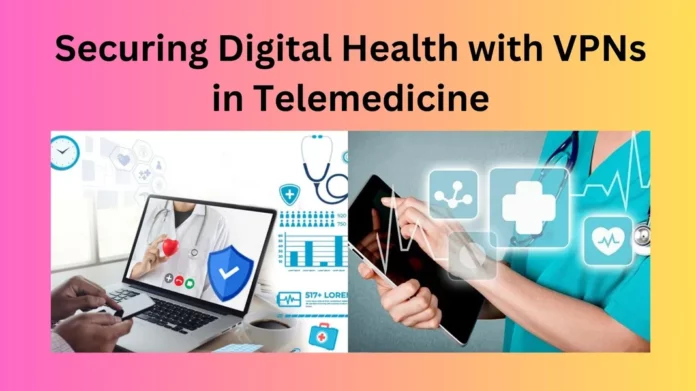In today’s digital age, telemedicine has emerged as a revolutionary means of providing medical care. It allows patients to connect with healthcare professionals from the comfort of their homes, saving time and expanding access to healthcare.
However, the convenience of telemedicine comes with its own set of security concerns. With the sensitive nature of medical information involved, securing digital health in telemedicine is paramount. In this article, we will explore how Virtual Private Networks (VPNs) play a crucial role in enhancing the security of telemedicine.
Understanding the Need for Digital Health Security
1. The Risks in Telemedicine
Telemedicine has paved the way for patients to receive medical care remotely. But with this convenience comes the risk of data breaches and unauthorized access to sensitive patient information. The potential consequences of a security breach in telemedicine are dire and could lead to patient harm and legal complications.
2. The Vital Role of VPNs
Virtual Private Networks (VPNs) have gained prominence as a security tool in the digital age. These encrypted tunnels create a secure pathway for data to travel, protecting it from prying eyes. In the context of telemedicine, VPNs can offer an extra layer of security, ensuring that patient data remains confidential.
3. Encryption and Anonymity
One of the key features of VPNs is their ability to encrypt data. When a patient and a healthcare provider communicate through a VPN, their messages and files are scrambled into unreadable code, making it nearly impossible for cybercriminals to intercept or decipher the information. This encryption not only secures patient data but also ensures that the identity of the users remains anonymous.
4. Access Control and Authorization
VPNs allow healthcare providers to control who has access to the telemedicine platform. This control includes authorization based on user credentials. It ensures that only authorized personnel can access patient records and communicate with patients, reducing the risk of unauthorized breaches.
Enhancing Patient-Doctor Trust
1. Building Trust in Telemedicine
Patients need to have trust in the telemedicine platform to share their medical information openly. Trust is the cornerstone of a strong doctor-patient relationship, and without it, telemedicine can falter. VPNs reassure patients that their data is secure, helping build trust in the telemedicine process.
2. Peace of Mind
VPNs offer patients peace of mind, knowing that their confidential medical records are well-protected. This peace of mind is essential for patients to be open and honest about their medical conditions, which is crucial for accurate diagnoses and effective treatment.
3. Mitigating Cyber Threats
In today’s world, cyber threats are omnipresent. VPNs act as a shield against these threats, ensuring that the data shared in telemedicine remains inaccessible to malicious actors. This layer of security builds confidence in the telemedicine system.
4. Complying with HIPAA Regulations
The Health Insurance Portability and Accountability Act (HIPAA) in the United States mandates stringent privacy and security regulations for healthcare providers. Using VPNs in telemedicine helps providers comply with HIPAA standards, protecting patient data and avoiding legal repercussions.
Telemedicine’s Future with VPNs
1. Expanding Access to Healthcare
As telemedicine becomes an integral part of healthcare, VPNs will play a pivotal role in securing digital health. With their ability to protect patient data and ensure secure communication, VPNs can help expand access to healthcare services, especially in remote or underserved areas.
2. Enabling Global Collaboration
VPNs enable healthcare professionals to collaborate globally, breaking down geographical barriers. This fosters knowledge sharing, which can lead to better healthcare outcomes for patients worldwide.
3. Convenience Without Compromise
Telemedicine’s convenience should not come at the cost of patient data security. VPNs strike the right balance, allowing patients to enjoy remote healthcare without compromising the confidentiality of their medical information.
4. The Future of Telemedicine Security
The future of telemedicine will undoubtedly see further advancements in security technology. VPNs will evolve to provide even more robust protection for patient data, making telemedicine an even more secure and trusted method of healthcare delivery.
Conclusion
In an era where digital health is gaining prominence, the need to secure telemedicine is more significant than ever. VPNs serve as the guardians of patient data, ensuring that confidential information remains private and secure. They enhance patient trust, mitigate cyber threats, and contribute to the growth of telemedicine. As the telemedicine landscape continues to evolve, VPNs will play an increasingly critical role in safeguarding the digital health of millions worldwide.
Frequently Asked Questions (FAQs)
FAQ 1: Are VPNs legal for use in telemedicine?
Yes, VPNs are legal and widely used for securing telemedicine. They are essential for protecting patient data and ensuring the privacy of healthcare interactions.
FAQ 2: Can patients trust the security of telemedicine platforms with VPNs?
Absolutely. VPNs add an extra layer of security, making telemedicine platforms more trustworthy for patients. Patients can feel confident that their medical information is well-protected.
FAQ 3: Do VPNs slow down telemedicine connections?
In most cases, the impact on connection speed is negligible. Modern VPNs are designed to maintain a smooth and secure telemedicine experience.
FAQ 4: How do VPNs comply with healthcare regulations like HIPAA?
VPNs can be configured to meet the security and privacy requirements of regulations like HIPAA, making them an essential tool for healthcare providers.
FAQ 5: Can I use a free VPN for telemedicine?
While free VPNs exist, it’s advisable to use a reputable, paid VPN service for telemedicine to ensure the highest level of security and privacy.















